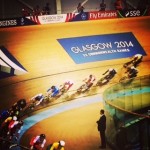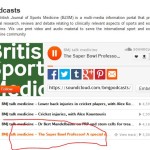By Doctor Rebecca Robinson @RjpRobinson
In July 2014, I was fortunate enough to be offered the opportunity of a registrar’s lifetime. Working with Team England in medical headquarters for the Glasgow Commonwealth Games. Here are my Top 5 Tips:
 1. Preparation, preparation, organisation
1. Preparation, preparation, organisation
Games time comes and goes fast, so do your homework. Arriving a week before the Opening Ceremony in Glasgow provided a great opportunity to set up an efficient medical room. Check out competition schedules, venues and transport systems now to deliver care smoothly.
Medically screening the majority of the 600 Team England competitors as they arrived was invaluable to avoid last-minute concerns, with additional benefits in establishing athlete-doctor relations.
Familiarise yourself with the arena and its rules: can you see the athlete in the mixed zone? Where is the defibrillator and can you switch it on? Who can treat a blood injury in a boxing ring? With a grasp of the basics, immersing yourself in the squash court, judo hall, velodrome and track adds immeasurably to theoretical knowledge.
2. Work with the best to become better
A multisport games is a unique melting pot. The world’s best athletes supported by expertise in sports medicine, physiology and management garnished by multinational cultures.
Working alongside a wealth of experience in Team England Headquarters revealed a group of individuals every bit as dedicated as the podium athletes with their indefatiguable work-ethic.
Simply existing in this environment is a unique learning experience. Be observant.
Key to Team England was a cohesive, supportive team environment across medics, physios and HQ staff, in which all members views were valued.
There will be times to take initiative, but recognise the expertise around you. With hard work, you’ll be back for future games, but your athlete may not. If in doubt or if you think you know the answer: ask. Remember there’s no such thing as a stupid question. Do not work in isolation or outside your competency.
3. Pace Yourself
It’s a marathon. And a sprint, rugby sevens, a triathlon and track cycling: and that’s just day 1!
With a 3-week stay in the Village bubble, it was imperative to sustain energy to respond safely to medical emergencies, meet last-minute needs of anxious athletes calmly and keep a ready smile for every single volunteer, physio, cleaner and policeman (yes, they really do smile at you at Games time!)
Everyone making the games happen faces challenges and will be both exhilarated and exhausted at times. Remembering to eat, sleep, communicate with loved ones outside are essentials. Turn around to make sure your colleagues do this too. A smile, a coffee run or a supportive shoulder can make a world of difference.
4. Primum non nocere
The first rule of medicine generates ethical debate in the elite sporting arena, where medals define careers.
What is your role: to help win the medals or protect the athlete’s health? Injuries in competition demand precise evaluation: how will they impact performance now and what are the longer-term health outcomes your focused athlete cannot visualise?
The depth of senior medical experience contributing to Team England meant athletes were able to make informed decisions with their team.
Sometimes dreams are shattered in the field of play. A sensitive approach to the injured athlete, with a clear team-based management plan will not lessen the pain but can help ensure healing starts in the Village.
Management in Glasgow was facilitated by good venue medical facilities and safe field-of-play retrieval, followed by accessible Polyclinic resources including 24-hour on-site clinics and onsite radiology.
5. ‘Be Kind’ (Dr Mike Loosemore, CMO Team England)
The Commonwealth ‘Friendly Games’ is a microcosm in which tiny countries can produce sporting greatness alongside larger, expectant nations. Like all major Games, it is also a hotbed of ambition, where 7000 dreams shimmer on the cusp of reality.
An 11-day Games represents the pinnacle of careers, dreams and sheer sweat, blood and determination. Be mindful that this will alter over the course of a games as winners and losers emerge. Be on hand in triumph or disaster but don’t intrude. Resist the urge to take that selfie or add pressure to the expectations of an athlete. On the flip side, you can be well-placed to advise the hurt, anxious or unwell athlete who approaches you. Be sensitive. Be kind.
With special thanks to:
Dr Mike Loosemore, Dr Pippa Bennett, Dr Paul Dijkstra, Dr Graeme Wilkes, Dr Mike Rossiter, Dr Abosede ‘GB’ Ajayi, Dr Stephen Chew, Dr Greg Whyte, Chef de Mission Jan Patterson and Team for all their support.
Editor’s question: Is Chessboxing in the Commonwealth Games?
You might also like:
